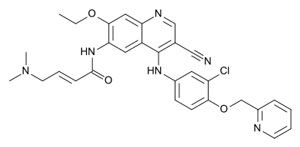Extended Adjuvant Treatment With Neratinib Improves DFS in Breast Cancer
Extended adjuvant treatment with neratinib (PB272, HKI-272) significantly improved disease-free survival (DFS) compared with placebo for patients with HER2-positive breast cancer who received prior adjuvant trastuzumab.
Neratinib

Own work
"Neratinib skeletal" by Anypodetos-. Licensed under Public domain via Wikimedia Commons.
Extended adjuvant treatment with neratinib (PB272, HKI-272) significantly improved disease-free survival (DFS) compared with placebo for patients with HER2-positive breast cancer who received prior adjuvant trastuzumab, according to early phase III results released by Puma Biotechnology, the company developing the drug.
In the randomized ExteNET trial, 2821 patients with HER2-positive breast cancer had undergone surgery and received adjuvant trastuzumab. Following trastuzumab, patients were randomized to 1-year of placebo or the HER2-targeted TKI neratinib. Overall, extended adjuvant treatment with neratinib extended DFS by 33% compared with placebo (HR = 0.67;P= .0046). When including ductal carcinoma in situ (DCIS), DFS was improved by 37% with neratinib compared with placebo (HR = 0.33;P= .0009). Based on these results, Puma announced plans to submit a new drug application to the FDA in 2015.
“This represents the first trial with a HER2-targeted agent that has shown a statistically significant benefit in the extended adjuvant setting, which we believe provides a meaningful point of differentiation for neratinib in the treatment of HER2-positive breast cancer,” Alan H. Auerbach, chief executive officer and president at Puma, said in a statement.
Patients in the study had stage II to stage IIIc node-positive, HER2-positive breast cancer. Those with heart disease or a QTc interval of >0.45 seconds were excluded from the study. Continuous neratinib was administered orally at 240 mg daily. Secondary endpoints of the study included time to distant recurrence, DFS specific to DCIS, distant DFS, and overall survival. Full results from the study are expected later this year.
“While the use of trastuzumab in the adjuvant setting has led to a reduction in disease recurrence in patients with early stage HER2-positive breast cancer, there remains an unmet clinical need for further improvement in outcome in order to attempt to further reduce this risk of recurrence," Auerbach said. "The results of the ExteNET study demonstrate that we may be able to provide this type of improvement with neratinib to further help the patients with this disease.”
In addition to the positive phase III findings, Puma also announced that it had updated its licensing agreement for neratinib with Pfizer, the company that initially discovered the compound. Under the amended agreement, Puma will now pay all expenses associated with the clinical trials. Additionally, the rate for royalties paid to Pfizer will be fixed in the 13-15% range, rather than between 10-20%, as it was previously.
“By assuming responsibility for the expenses associated with the ongoing legacy clinical trials, and by fixing the royalty rate for the drug at a reduced rate, we believe that we have significantly improved the potential value of the drug,” said Auerbach.
Following both announcements, Puma's stock more than tripled in after-hours trading.
Neratinib continues to be explored for other indications within HER2-positive breast cancer. Additionally, the drug is being explored in non-small cell lung cancer and other solid tumors withHER2mutations.
In the I-SPY 2 trial, a neoadjuvant regimen of neratinib and standard chemotherapy significantly improved pathologic complete response (pCR) for high-risk patients with hormone receptor-negative, HER2-positive stage II/III breast cancer. In this trial, which used a novel adaptive design, neratinib had an estimated pCR of 55%, according to results presented at the AACR Annual Meeting.
Based on the statistical design of the trial, the predictive probability of success in a future, randomized 300-patient phase III trial was 79%. Researchers suggested that the neoadjuvant neratinib combination had a 72.7% probability of showing statistical superiority to trastuzumab plus paclitaxel in patients with HER2-positive breast cancer.